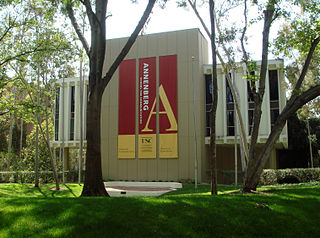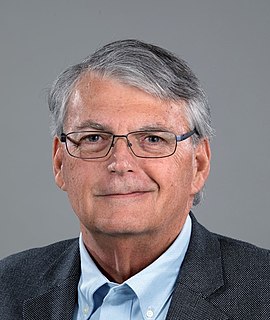Related Research Articles
Media studies is a discipline and field of study that deals with the content, history, and effects of various media; in particular, the mass media. Media Studies may draw on traditions from both the social sciences and the humanities, but mostly from its core disciplines of mass communication, communication, communication sciences, and communication studies.
A journalism school is a school or department, usually part of an established university, where journalists are trained. An increasingly used term for a journalism department, school or college is 'J-School'. Today, in many parts of the world it is usual for journalists to first complete university-level training which incorporates both technical skills such as research skills, interviewing technique and shorthand and academic studies in media theory, cultural studies and ethics.
Mass communication is the process of imparting and exchanging information through mass media to large segments of the population. It is usually understood for relating to various forms of media, as its technologies are used for the dissemination of information, of which journalism and advertising are part. Mass communication differs from other forms of communication, such as interpersonal communication and organizational communication, because it focuses on particular resources transmitting information to numerous receivers. The study of mass communication is chiefly concerned with how the content of mass communication persuades or otherwise affects the behavior, the attitude, opinion, or emotion of the people receiving the information.
In media studies, mass communication, media psychology, communication theory, and sociology, media influence and media effects are topics relating to mass media and media culture's effects on individual or an audience's thoughts, attitudes, and behavior. Whether it is written, televised, or spoken, mass media reaches a large audience. Mass media's role and effect in shaping modern culture are central issues for study of culture.
The Association for Education in Journalism and Mass Communication (AEJMC) is a major international membership organization for academics in the field, offering regional and national conferences and refereed publications. It has numerous membership divisions, interest groups, publications and websites.

Science journalism conveys reporting about science to the public. The field typically involves interactions between scientists, journalists, and the public.
The Missouri School of Journalism at the University of Missouri in Columbia is one of the oldest formal journalism schools in the world. The school provides academic education and practical training in all areas of journalism and strategic communication for undergraduate and graduate students across several media including television and radio broadcasting, newspapers, magazines, photography, and new media. The school also supports a robust advertising and public relations curriculum.

The USC Annenberg School for Communication and Journalism comprises a School of Communication and a School of Journalism at the University of Southern California (USC). Starting July 2017, the school’s Dean is Willow Bay, succeeding Ernest J. Wilson III. The graduate program in Communications is consistently ranked first according to the QS World University Rankings.
Media psychology is the branch and specialty field in psychology that focuses on the interaction of human behavior with media and technology. Media psychology is not limited to mass media or media content; it includes all forms of mediated communication and media technology-related behaviors, such as the use, design, impact and sharing behaviors. This branch is a relatively new field of study because of advancement in technology. It uses various methods of critical analysis and investigation to develop a working model of a user's perception on media experience. These methods are used for society as a whole and on an individual basis. Media psychologists are able to perform activities that include consulting, design, and production in various media like television, video games, films, and news broadcasting. Media psychologists are not considered to be those who are featured in media, rather than those who research, work or contribute to the field.

Mark W. Tatge is an American journalist, author, and college professor. He was a senior editor at Forbes magazine's Midwest Bureau, a staff reporter at The Wall Street Journal, an investigative reporter in the Statehouse Bureau of Cleveland's The Plain Dealer, and is the 2014 recipient of the Baldwin Fellowship at University of South Carolina where he is nearing completion of a PhD in Mass Communication (2017).

The UNC Hussman School of Journalism and Media is a nationally accredited professional undergraduate and graduate level journalism school at the University of North Carolina at Chapel Hill. The school, founded in 1950, is ranked competitively among the best journalism schools in the United States. The school offers undergraduate degrees in media & journalism as well as advertising & public relations. It offers master's degrees in journalism, strategic communication, and visual communication and doctoral degrees in media & communication.
The School of Communication and Information (SC&I) is a professional school within the New Brunswick Campus of Rutgers, The State University of New Jersey. The school was created in 1982 as a result of a merger between the Graduate School of Library and Information Studies, the School of Communication Studies, and the Livingston Department of Urban Journalism. The school has about 2,500 students at the undergraduate, masters, and doctoral levels, and about 60 full-time faculty.
James E. Katz is an American communication scholar with an expertise in new media. He has published widely and is frequently invited to comment on his research at both academic and public policy forms as well as to give interviews to media outlets.
Computational journalism can be defined as the application of computation to the activities of journalism such as information gathering, organization, sensemaking, communication and dissemination of news information, while upholding values of journalism such as accuracy and verifiability. The field draws on technical aspects of computer science including artificial intelligence, content analysis, visualization, personalization and recommender systems as well as aspects of social computing and information science.
Stuart N. Brotman is an American government policymaker; university professor; management consultant; lawyer; author and editorial adviser; and non-profit organization executive. He has taught students from 42 countries in six separate disciplines — Communications, Journalism, Business, Law, International Relations and Public Policy. He also has advised private and public sector clients in more than 30 countries in five continents.
The A.Q. Miller School of Journalism and Mass Communications offers distinguished programs of instruction and research leading to the bachelor's and master's degrees in mass communications at Kansas State University. Undergraduates can pursue a science or arts degree in one of two sequences: Journalism and Digital Media and Strategic Communications. Emphases include drone journalism, news broadcasting, graphics production, public relations, and advertising. The Miller School teaches drone photography and video in partnership with the K-State Polytechnic Unmanned Aircraft Systems Flight and Operations program. The School collaborates in the Kansas State interdisciplinary doctoral degree program in leadership communication with departments of Communication Studies, Leadership Studies, Communications and Agricultural Education, and the Institute of Civic Discourse and Democracy.
Various aspects of communication have been the subject of study since ancient times, and the approach eventually developed into the academic discipline known today as communication studies.

Multimedia journalism is the practice of contemporary journalism that distributes news content either using two or more media formats via the Internet, or disseminating news report via multiple media platforms. It is inseparably related to the media convergence of communication technologies, business integration of news industries, and editorial strategies of newsroom management.

Dr. Ruben is a Distinguished Professor of Communication, Department of Communication, Rutgers School of Communication and Information. He is the Founder and Senior University Fellow in the Rutgers Center for Organizational Leadership, and also serves as Advisor for Strategy and Planning in the Office to the Executive Vice President for Academic Affairs. Dr. Ruben is also a member of faculties of Robert Wood Johnson School of Medicine and the Ph.D. Program in Higher Education in the Rutgers Graduate School of Education. His academic career has been devoted to advancing interdisciplinary and systemic approaches to the study of communication, and the application of these frameworks in cross-cultural, health, educational, organizational, and leadership contexts. He is author of more than 50 books and 135 journal articles in these areas.
References
- 1 2 3 "John V. Pavlik". Rutgers University Web site. Archived from the original on 2012-12-14. Retrieved 2009-02-28.
- 1 2 Pavlik, John V. (2000-07-25). "How the Web is changing art and art appreciation". CNN. Retrieved 2009-02-28.
- ↑ Ho-lin, Lin (April 3, 2000). "Internet news faces question of identity -". Taipei Times . Retrieved 26 April 2013.